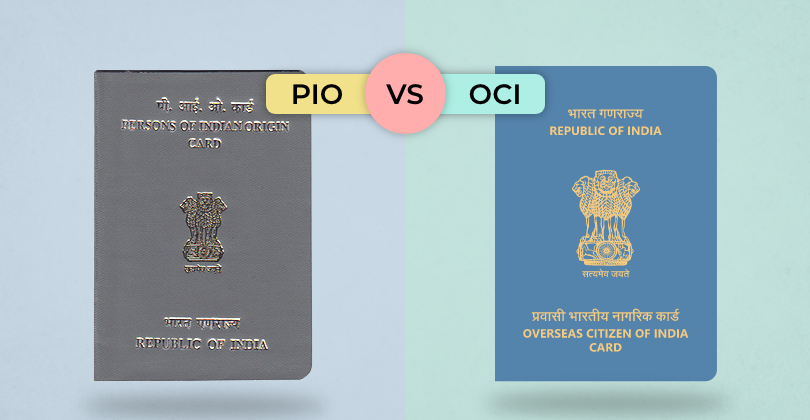Are you of Indian origin and living abroad? You've probably come across terms like PIO and OCI. These cards offer different benefits, but it can
What is an NBFC? is a common question asked by individuals trying to understand the role of Non-Banking Financial Companies. NBFCs are indeed intriguing entities with a significant impact on the vast world of finance.
They possess the potential to reshape our perception of conventional banking services by offering a wide range of tempting financial options, all without the need for a banking license. These enigmatic organisations play a vital role in the financial landscape, acting as crucial intermediaries between traditional banks and underserved population segments.
In this article, let us explore what NBFC is, seeking to enhance our understanding and motivation to learn more about their fascinating operations.
What are NBFCs, and Why Do They Exist?
When discussing financial institutions, the query of what NBFCs are often arises to differentiate them from traditional banks. Non-Banking Financial Companies are financial institutions that offer various banking and financial services, similar to conventional banks, but without holding a banking licence. NBFCs play a crucial role in the Indian financial system and have become an integral part of the economy.
NBFCs cater to the diverse financial needs of individuals and businesses that may need access to or prefer not to approach traditional banks. They offer various financial products and services, including loans, advances, asset financing, investments, and insurance. NBFCs are known for their flexibility in designing customised financial solutions and providing quick access to credit even to consumers who are new to credit (NTC)
The primary reasons for the existence of NBFCs are to promote financial inclusion, support the economy's growth, and fill the gaps left by traditional banking institutions. They cater to segments such as small and medium-sized enterprises (SMEs), rural areas, and underserved individuals who might not meet the requirements of banks. NBFCs contribute to economic development by channelling funds to sectors that need financial support, thus fostering entrepreneurship, employment generation, and overall economic growth.
NBFCs serve as an alternative source of finance, ensuring financial inclusion, stimulating economic growth, and providing accessible and flexible financial solutions to a wide range of customers.
Understanding The Different Types of NBFCs & Their Advantages
There are different types of Non-Banking Financial Companies (NBFCs) in India, each with unique characteristics and advantages.
-
Asset Finance Companies (AFCs)
These NBFCs primarily provide loans for purchasing or leasing machinery, equipment, or vehicles. Their advantage lies in facilitating asset acquisition for businesses without needing significant upfront investments.
-
Investment Companies (ICs)
ICs mainly invest in shares, stocks, bonds, or securities the government or corporations issue. They offer advantages such as diversification of investment portfolios and professional management of investments.
-
Companies (LCs)
LCs focus on providing loans and advances to Loan individuals and businesses. Their advantages include flexibility in lending practices, quicker loan processing, and customised loan products.
-
Infrastructure Finance Companies (IFCs)
IFCs primarily finance infrastructure projects such as roads, power, telecommunications, etc. Their advantage lies in promoting and supporting the development of critical infrastructure, contributing to economic growth.
-
Microfinance Institutions (MFIs)
MFIs provide small loans, known as microcredit, to low-income individuals and microenterprises. Their advantage lies in promoting financial inclusion, empowering the economically vulnerable, and fostering entrepreneurship.
These different types of NBFCs cater to diverse financial needs and sectors, offering advantages such as specialised financing solutions, accessibility, faster processing, and supporting specific areas of economic development.
What Regulation Governing NBFCs and How Are They Regulated?
NBFCs in India are regulated by the Reserve Bank of India (RBI) under the provisions of the Reserve Bank of India Act, 1934. The regulatory framework ensures that NBFCs operate transparently, securely, and with stablity, safeguarding investors' interests and maintaining financial stability.
The regulatory regime for NBFCs includes several guidelines and regulations issued by the RBI, covering aspects such as capital adequacy, prudential norms, risk management, governance, and reporting requirements. NBFCs must obtain a Certificate of Registration (CoR) from the RBI to commence operations and must comply with ongoing regulatory requirements.
The RBI regulates NBFCs through a combination of on-site inspections, off-site surveillance, submission of periodic reports, and compliance with prescribed norms. The regulatory framework aims to balance promoting the NBFC sector's growth while ensuring financial stability and consumer protection.
In recent years, the RBI has introduced several reforms and enhanced regulatory measures to strengthen the oversight of NBFCs, including stricter capital adequacy norms, risk management guidelines, and governance reforms. The aim is to foster a robust and resilient NBFC sector that contributes to the overall stability of the financial system.
Guidelines for NBFCs: Ensuring Compliance and Consumer Protection
Non-Banking Financial Companies in India are required to adhere to various guidelines and regulations defined by the RBI. These guidelines ensure the smooth functioning, stability, and integrity of NBFC operations. Some fundamental guidelines that NBFCs need to follow include:
-
Deposit Regulations
NBFCs cannot accept deposits payable on demand. Public deposits can be accepted for a duration of 12 to 60 months. The interest rates charged by the company should not exceed the limit prescribed by the Reserve Bank of India.
-
Reporting Requirements
NBFCs must provide regular updates and information to the Reserve Bank of India, including details about the company, any changes in its composition, audited balance sheets, and statutory returns on deposits (Form NBS-1). Quarterly returns on liquid assets, half-yearly Asset Liability Management (ALM) returns, and credit ratings must also be submitted.
-
Consumer Protection
NBFCs must maintain a minimum of 15% of their public deposits as liquid assets. If an NBFC defaults on payment, consumers can seek recourse by filing suits with the National Company Law Tribunal or the Consumer Forum.
Adhering to these guidelines ensures compliance, financial stability, and consumer protection. It also fosters transparency, accountability, and responsible financial practices within the NBFC sector.
Conclusion
NBFCs (Non-Banking Financial Companies) are financial institutions that operate without a banking license and provide a wide range of banking and financial services. NBFCs serve as an alternative source of finance, catering to the financial needs of individuals and businesses who may not have access to or prefer not to approach traditional banks. They play a vital role in promoting financial inclusion, supporting economic growth, and filling the gaps left by conventional banking institutions.
For those seeking quick and convenient personal loans, KreditBee offers a user-friendly online lending platform. KreditBee specialises in instant personal loans with a simple application process and prompt disbursal. Whether you require funds for education, medical expenses, or any other financial need, KreditBee provides accessible loan options. Visit the KreditBee website today to explore their offerings and access the financial assistance you require.
AUTHOR
KreditBee As a market leader in the Fintech industry, we strive to bring you the best information to help you manage finances better. These blogs aim to make complicated monetary matters a whole lot simpler.







